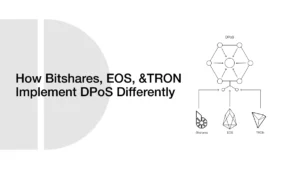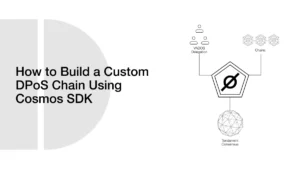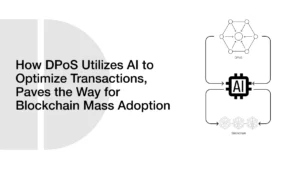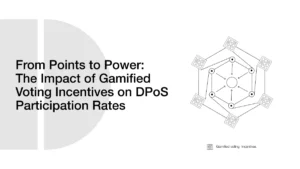Token Holder Cartels: Can DPoS Stop Concentrated Power Structures?
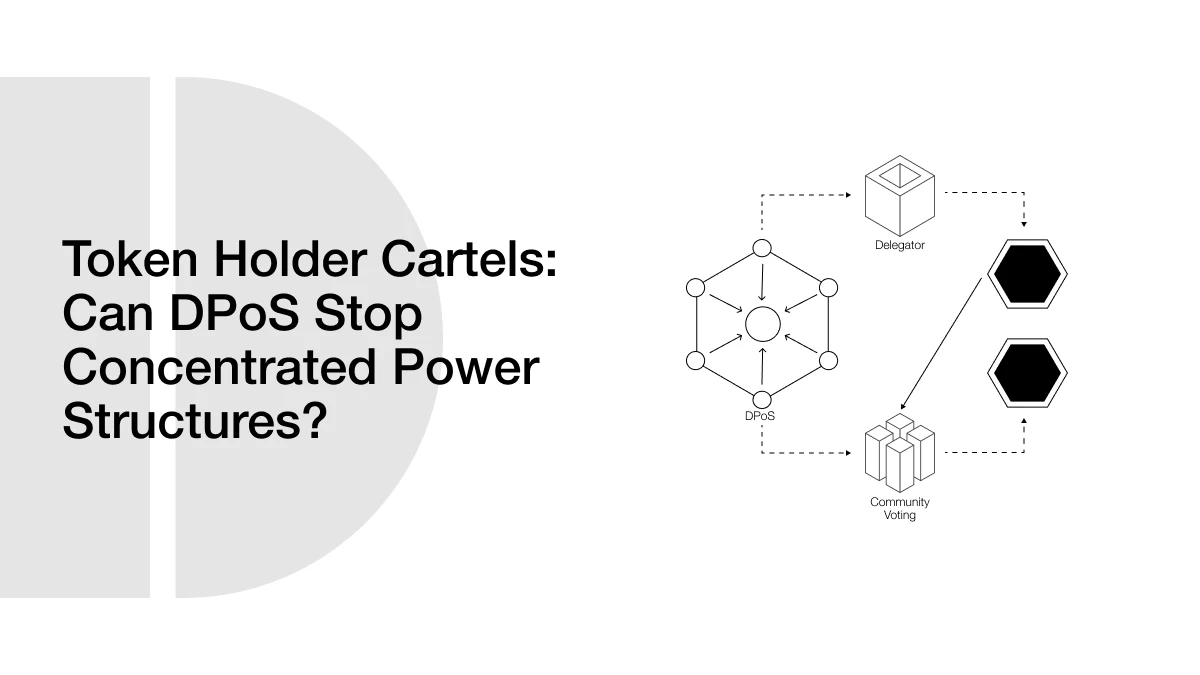
Blockchain was created to give people freedom and fairness. The idea was that no one person or company should control the system. Instead, everyone would share power through rules that are open and transparent. But in practice, many blockchains still struggle with the same old problem: concentration of power. When a few people control most of the tokens, they can control the whole network.
- What Are Token Holder Cartels?
- Why Large Holders Control Governance Power
- Examples of Cartel-Like Behavior in DAOs
- Why Cartels Hurt Decentralization
- How DPoS Works in Blockchain Governance
- How Token Holders Elect Delegates
- Key Differences Between DPoS, PoW, and PoS
- Popular Blockchains Using DPoS (EOS, TRON, etc.)
- The Risk of Concentrated Power in DPoS
- How Whales Still Dominate DPoS Voting
- The Problem of Collusion Among Delegates
- Voter Apathy and Low Participation Rates
- Academic Warnings About Power Imbalances
- Can DPoS Stop Token Holder Cartels?
- Strengths of DPoS Against Centralization
- Weaknesses That Allow Cartels to Survive
- Why Transparency Is Not Always Enough
- Lessons from Existing Blockchain Networks
- Alternative Solutions to Break Concentration
- Quadratic Voting and Why It Helps
- Reputation-Based Voting as a Fairer Model
- Soulbound Tokens (SBTs) and Non-Transferable Reputation
- Hybrid Systems That Mix Multiple Models
- Case Studies of Power Struggles in DAOs
- MakerDAO: Venture Capital Influence
- EOS: Delegate Collusion and Block Production Issues
- TRON: Super Representatives and Whale Control
- Decentraland: The Voter Apathy Problem
- The Role of Regulation in Preventing Cartels
- DAO Laws Like Wyoming DAO LLC
- The Ooki DAO Case and Its Legal Impact
- Can Regulations Protect Small Token Holders?
- Tension Between Decentralization and State Control
- Global Lessons on Decentralized Governance
- How the Global North Adopts Blockchain Governance
- Risks of “Digital Colonialism” in the Global South
- Authoritarian States Using Blockchain for Power
- Can DPoS Promote True Global Inclusion?
- Pros and Cons of Blockchain Governance by Region
- Future of DPoS in Breaking Cartels
- The Idea of Rotating Governance Councils
- How AI Could Help Monitor Delegates
- Why Hybrid Governance Could Be the Future
- More Participation as the Key to Fairness
- Conclusion
- Frequently Asked Questions About Token Holder Cartels
- What is a token holder cartel in DPoS?
- Can DPoS stop cartels completely?
- How does quadratic voting help against cartels?
- Why is voter participation important in DPoS?
- What future tools can improve DPoS governance?
- Glossary of Key Terms
A cartel forms when a small group of people with a lot of tokens decide to work together. They can vote in ways that benefit only themselves. They can also block changes that would help the community. This is why token holder cartels are dangerous. They create unfair systems where the “decentralized” network becomes controlled by only a few big players.
Delegated Proof of Stake, also called DPoS, was designed to solve this problem. Instead of every token holder voting directly on every decision, people can delegate their votes to trusted representatives called delegates. The goal is to make the system faster, more efficient, and fairer.
This blog will look at what token holder cartels are, how DPoS works, why concentration of power is still a problem, and what solutions may help. Plus, it will also see case studies from DAOs and blockchain networks to understand if DPoS really prevents unfair control.
What Are Token Holder Cartels?
A token holder cartel is when a small group of people owns enough tokens to control decisions in a blockchain. In simple terms, it means a few “whales” (large token holders) can decide the rules for everyone else. Even though blockchain is supposed to be democratic, cartels make it act more like a monopoly.
Why Large Holders Control Governance Power
Most blockchain voting systems give power based on the number of tokens. The more tokens you have, the more voting rights you hold. This makes it easy for early investors, wealthy players, or big funds to dominate. They can team up with each other and push decisions in their favor.
Examples of Cartel-Like Behavior in DAOs
Some Decentralized Autonomous Organizations (DAOs) already show this problem. In MakerDAO, large venture capital firms like Andreessen Horowitz gained significant influence by buying large amounts of governance tokens. In other cases, such as EOS and TRON, small groups of delegates controlled block production by forming alliances. Studies show that many DAOs face low participation, leaving more room for cartels to dominate (Esposito, Tse, & Goh, 2025).
Why Cartels Hurt Decentralization
Cartels damage trust in blockchain. Instead of being fair and open, the system starts to look like traditional finance, where only the rich make the rules. This reduces fairness, scares away small users, and can slow down innovation. True decentralization requires wide participation, not control by a few.
ALSO READ: DPoS in 6G Networks: The Future of Blockchain and Hyperconnected Economies
| DAO / Blockchain | Top Token Holders’ Control | Small Holder Participation | Result |
| MakerDAO | VCs owned over 10% of tokens | Low turnout (<5%) | High centralization |
| EOS | 21 block producers rotate, but are dominated by a few | Low small-voter impact | Delegate collusion |
| Decentraland | Less than 1% active voters | Very low participation | Governance apathy |
How DPoS Works in Blockchain Governance
Delegated Proof of Stake, or DPoS, is a way of running blockchains that focuses on speed and efficiency. Instead of everyone voting directly on every transaction or rule, token holders choose a smaller group of people called delegates. These delegates are trusted to make decisions and add new blocks to the chain. This setup makes blockchains faster than systems like Proof of Work (PoW), which requires heavy energy use, or Proof of Stake (PoS), which can still be slow when everyone votes directly.
How Token Holders Elect Delegates
In DPoS, every person who owns tokens can vote. But instead of voting on everything themselves, they vote for delegates. A delegate is like a representative. Token holders pick the delegates they trust to make fair and smart decisions. If a delegate performs badly or acts unfairly, token holders can take back their votes and choose someone else. This makes DPoS more flexible than older systems.
Key Differences Between DPoS, PoW, and PoS
The main difference is how decisions and block production happen. In PoW, like Bitcoin, miners compete to solve puzzles using energy. In PoS, token holders stake their coins to secure the network and earn rewards. In DPoS, the process is more like an election system. A few elected delegates handle block production and governance. This makes DPoS much faster and less energy-intensive. However, it also raises concerns about whether too few people end up with too much power (Murtazashvili et al., 2022).
| Feature | Proof of Work (PoW) | Proof of Stake (PoS) | Delegated Proof of Stake (DPoS) |
| Energy Use | Very high | Low | Very low |
| Transaction Speed | Slow | Faster than PoW | Fastest |
| Participation Method | Mining | Staking | Voting for delegates |
| Risk of Centralization | Mining pools | Token whales | Delegate collusion |
Popular Blockchains Using DPoS (EOS, TRON, etc.)
Several well-known blockchains use DPoS today. EOS is one of the most famous examples. It allows token holders to vote for 21 block producers who manage the network. TRON is another example, where delegates are called “Super Representatives.” Both networks have shown the benefits of speed and scale, but also the risks of cartel-like behavior when a small group of delegates dominates block production. Researchers argue that while DPoS improves efficiency, it still struggles with preventing the concentration of power.
The Risk of Concentrated Power in DPoS
How Whales Still Dominate DPoS Voting
Even though DPoS is meant to be fair, it often ends up favoring the richest token holders, also called whales. Since voting power usually depends on the number of tokens, whales can cast more votes than small holders. This means they can choose delegates who will support their interests. Over time, this leads to a cycle where the same delegates stay in power because they are backed by the largest wallets. Studies show that DAOs with token-based voting often face this issue, with decision-making dominated by just a few big players (Peña-Calvín et al., 2024).
The Problem of Collusion Among Delegates
Another risk is collusion, which means delegates secretly working together to stay in control. For example, in networks like EOS, some block producers have been accused of making backroom deals with each other. They vote for one another and share rewards, which locks out smaller players. This kind of behavior makes the system look less like a democracy and more like a private club. While blockchain is supposed to prevent corruption, collusion shows how human behavior can still tilt the system toward unfair power structures.
ALSO READ: DPoS Governance Insurance: Can Delegators Hedge Against Delegate Failure?
Voter Apathy and Low Participation Rates
A major weakness in DPoS is voter apathy. Many small token holders don’t vote at all. This can happen because they feel their votes don’t matter, or because the process is too technical and confusing. For example, in Decentraland, average voter participation per proposal was less than 1%. When few people participate, whales and cartels have an easier time taking control. Low turnout creates a system where decisions reflect only a small part of the community, which weakens the idea of decentralization.
Academic Warnings About Power Imbalances
Researchers argue that token-based governance often risks becoming plutocratic, meaning rule by the wealthy. The danger is that blockchain governance starts to copy traditional financial systems, where a few players dominate markets and decisions. Digital commons like DAOs need stronger safeguards to prevent power concentration. Without these safeguards, DPoS may improve efficiency but still fail at true decentralization.
Can DPoS Stop Token Holder Cartels?
Strengths of DPoS Against Centralization
One of the biggest strengths of DPoS is speed. Because only a few delegates are chosen to run the network, decisions and block production happen quickly. This also lowers costs and energy use compared to Proof of Work. Another strength is that token holders can remove bad delegates at any time. If a delegate acts unfairly, people can vote them out. This creates accountability. DPoS also makes governance more organized since not everyone needs to vote on everything all the time.
Weaknesses That Allow Cartels to Survive
Even with its strengths, DPoS cannot fully stop the concentration of power. Wealthy token holders still have more influence because their votes carry more weight. Delegates with strong backing from whales often stay in power for long periods. This creates a closed circle where it is very hard for new participants to compete. Cartels form when these whales and delegates align their interests. Instead of protecting decentralization, DPoS can sometimes give cartels more tools to stay in control.
Why Transparency Is Not Always Enough
In theory, blockchain’s open records should make corruption easy to spot. Everyone can see which delegate was chosen and how votes were cast. But transparency does not always lead to fairness. For example, if whales openly dominate the vote, smaller holders may lose interest in participating. Transparency without equality does not solve the deeper issue of power imbalance. This is why new voting models are often suggested to improve DPoS.
Lessons from Existing Blockchain Networks
Looking at real projects helps us understand both sides. In EOS, speed and efficiency are impressive, but a few groups dominate most block production. In TRON, the “Super Representatives” often stay the same because of whale support. These examples show that while DPoS helps with speed and scalability, it struggles to stop token cartels without extra safeguards.
| Factor | Strengths of DPoS | Weaknesses of DPoS |
| Efficiency | Faster decisions, low energy use | Delegates can collude |
| Accountability | Delegates can be voted out quickly | Whales dominate voting power |
| Participation | Easier for people to delegate than to vote always | Small holders lose influence, voter apathy rises |
| Decentralization Goal | More democratic than mining pools | Still risks plutocracy (rule by the wealthy) |
Alternative Solutions to Break Concentration
Quadratic Voting and Why It Helps
Quadratic voting is a new way to make voting fairer. Instead of giving power directly based on how many tokens someone owns, it increases the cost of extra votes. For example, if one vote costs one token, then two votes cost four tokens, and three votes cost nine tokens. This makes it very expensive for whales to buy hundreds of votes. Smallholders can still make their voices count because their collective votes weigh more in this system. Platforms like Gitcoin already use quadratic funding to support community projects fairly (Gitcoin Grants, 2020).
Reputation-Based Voting as a Fairer Model
Reputation-based voting gives people influence based on their contributions to the community, not just how many tokens they own. For example, someone who helps write code, test security, or educate new users might earn reputation points. These points can then be used in voting. This shifts the power from token-rich investors to active community members. It also encourages long-term participation rather than short-term profit-taking.
Soulbound Tokens (SBTs) and Non-Transferable Reputation
Soulbound Tokens, or SBTs, are tokens that cannot be sold or transferred. They represent achievements, skills, or contributions tied to a specific person. In governance, SBTs can be used to reward true community builders. Because they cannot be bought, whales cannot just purchase influence. However, the challenge is privacy and fairness. If all achievements are public, it may expose personal details or create new types of discrimination. Still, SBTs remain a promising idea for breaking the control of token cartels.
Hybrid Systems That Mix Multiple Models
Some experts argue that no single model is enough. Instead, hybrid systems can combine token-based voting with quadratic rules, reputation scoring, and even rotating councils. This way, token holders still have a say, but whales are checked by other governance tools. Projects like Optimism are experimenting with two-house systems, where one group manages tokens while another supports community values. These hybrid ideas may be the most realistic path toward fairer decentralized governance.
| Governance Model | How It Works | Strengths | Weaknesses |
| Token-Based Voting | Votes = tokens owned | Simple, widely used | Whales dominate, risk of cartels |
| Quadratic Voting | Cost grows as votes increase | Limits whale power, fairer to small users | More complex, harder to explain |
| Reputation-Based Voting | Votes earned by contributions | Rewards active community members | Hard to measure contributions fairly |
| Soulbound Tokens (SBTs) | Non-transferable tokens tied to users | Stops buying votes, values real identity | Privacy issues, risk of discrimination |
| Hybrid Systems | Mix of token, quadratic, reputation | Balances efficiency and fairness | Complex to set up and manage |
Case Studies of Power Struggles in DAOs
MakerDAO: Venture Capital Influence
MakerDAO is one of the oldest and most popular DAOs. It allows users to create the stablecoin DAI, which is backed by collateral. Over time, large venture capital firms like Andreessen Horowitz bought large amounts of MKR tokens. In 2018, Andreessen Horowitz purchased about 6% of the MKR supply, and later, other firms also gained control. This means that even though MakerDAO is decentralized, big financial players have a strong influence. Instead of being community-led, important decisions often reflect the interests of these large investors.
EOS: Delegate Collusion and Block Production Issues
EOS was designed as a fast and scalable blockchain using DPoS. Token holders elect 21 block producers to run the system. At first, this looked very democratic. But soon reports showed that some block producers were colluding. They voted for each other to stay in power, and sometimes even shared rewards. This made EOS less democratic because smaller token holders could not break into the system. Critics argue that EOS became more like a closed club of delegates than a fair community network.
TRON: Super Representatives and Whale Control
TRON also uses a DPoS system where token holders elect “Super Representatives.” These Super Representatives manage the network and approve transactions. In practice, the same group of delegates often stays in power because they are supported by whales with large amounts of TRX tokens. Like EOS, TRON has faced accusations of centralization and favoritism. While the network is efficient and fast, it has not fully escaped the problem of concentrated power.
Decentraland: The Voter Apathy Problem
Decentraland is a virtual world that runs on blockchain. It allows users to vote on proposals through a DAO. In theory, every land or token owner can take part. But in practice, very few people vote. Research shows that average participation per proposal was only 0.79%, and the median was just 0.16% (Peña-Calvín, Duenas-Cid, & Ahmed, 2025). This shows that most small holders don’t use their rights, leaving more room for larger holders to control the outcomes. Low engagement makes decentralization weaker, even if the system looks democratic on the surface.
The Role of Regulation in Preventing Cartels
DAO Laws Like Wyoming DAO LLC
In 2021, the state of Wyoming in the United States became the first to recognize DAOs as legal entities. This law allows DAOs to register as Limited Liability Companies (LLCs). Once registered, a DAO can sign contracts, own property, and have legal protection for its members. This kind of law is important because it gives DAOs more legitimacy in the traditional system. At the same time, critics say that turning DAOs into LLCs may force them to look more like traditional companies, which could hurt decentralization.
The Ooki DAO Case and Its Legal Impact
One of the most famous legal cases involving DAOs was the Ooki DAO case. In 2023, a U.S. court ruled that Ooki DAO operated an illegal trading platform without proper registration. The DAO was fined and later shut down. This case showed that regulators see DAOs as “persons” under the law, meaning they can be held responsible for breaking rules. The ruling was a warning that DAOs are not beyond the reach of regulators. If a DAO acts unfairly or ignores laws, regulators can step in and punish it.
Can Regulations Protect Small Token Holders?
Regulation can help protect small holders by creating clear rules. For example, regulators may require DAOs to have fair voting systems or to disclose who controls large amounts of tokens. This could make it harder for whales to form hidden cartels. However, too much regulation can also discourage innovation. If governments push DAOs to follow strict rules, it may slow down the growth of decentralized projects. This shows the balance that regulators need to maintain: enough oversight to stop abuse, but not so much that it kills creativity.
Tension Between Decentralization and State Control
The biggest question is whether regulation fits with the idea of decentralization. Blockchain was built to avoid a central authority. But once governments step in, they introduce new forms of centralized power. Some experts warn that strict regulation could turn DAOs into regular companies, losing the benefits of open and global governance. Others argue that without legal recognition, DAOs cannot survive in the long run. This debate will continue as more cases like Ooki DAO appear around the world.
Global Lessons on Decentralized Governance
How the Global North Adopts Blockchain Governance
In many developed countries, blockchain and DAOs are seen as tools for innovation. The focus is often on creating faster financial systems, open-source projects, and digital economies. In places like the United States and Europe, governments are beginning to recognize DAOs legally, as seen with Wyoming’s DAO law. At the same time, projects like Optimism and Arbitrum are experimenting with hybrid governance to solve decentralization challenges. These steps show that the Global North is treating blockchain as a serious part of future economies.
Risks of “Digital Colonialism” in the Global South
In developing countries, blockchain is often introduced by large global firms or investors. While it promises financial inclusion, it can sometimes repeat older problems of economic exploitation. Researchers call this digital colonialism, where wealthy countries and corporations use blockchain systems to extract value without truly empowering local communities. For example, small farmers may join blockchain projects but end up losing control to big investors who set the rules. This creates dependency instead of real freedom.
Authoritarian States Using Blockchain for Power
In some regions, especially under authoritarian governments, blockchain is being used to increase surveillance and control. For example, in China, blockchain technology has been added to national development policies, but in ways that strengthen government monitoring rather than community freedom (Hung, 2024). Instead of decentralization, it becomes another tool for centralized authority. This shows that technology alone cannot guarantee fairness; it depends on who controls it.
Can DPoS Promote True Global Inclusion?
The big question is whether DPoS can actually help balance these global differences. In theory, DPoS makes it easier for communities to participate because it reduces technical barriers. But if whales or powerful states dominate voting, then DPoS may not bring fairness to all regions. For DPoS to work globally, it must include safeguards like quadratic voting or rotating councils to prevent cartels from controlling the system. Otherwise, blockchain could deepen global inequality instead of reducing it.
Pros and Cons of Blockchain Governance by Region
| Region | Pros of Blockchain Governance | Cons / Risks of Blockchain Governance |
| Global North | Legal recognition, innovation, hybrid models | Risk of centralization under VC or corporate control |
| Global South | Financial inclusion, access to new markets | Digital colonialism, dependency on global firms |
| Authoritarian States | Efficiency in state projects | Increased surveillance, less citizen freedom |
| Global Perspective | Promotes decentralization ideals | Without safeguards, repeats old power structures |
Future of DPoS in Breaking Cartels
The Idea of Rotating Governance Councils
One idea for the future is rotating governance councils. Instead of having the same delegates in power all the time, new people take turns. This prevents a few delegates from holding control for years. By rotating members, blockchains can include fresh voices and reduce the chance of cartels forming. However, it also requires good transition rules so that new delegates understand their roles. Without structure, frequent changes could cause confusion.
How AI Could Help Monitor Delegates
Artificial intelligence (AI) may also play a role in the future of DPoS. AI tools can track how delegates behave in real time. If a delegate slows down, acts unfairly, or works with whales in secret, AI can flag this behavior. This kind of monitoring would make it easier for token holders to see who is trustworthy. AI could also suggest more effective strategies for rotating or replacing delegates based on performance data.
Why Hybrid Governance Could Be the Future
Many experts believe the best way forward is hybrid governance. This means mixing token-based voting with quadratic models, reputation points, and even legal safeguards. For example, Optimism’s two-house model shows how different voting systems can balance each other. Hybrid governance may sound complex, but it could be the only way to protect decentralization while still keeping things efficient.
More Participation as the Key to Fairness
No matter what model is used, one rule stays the same: participation is key. If only a small group votes, then whales and cartels win. But if more small holders and active community members join the process, power spreads more evenly. Education, better voting tools, and easier interfaces could encourage higher participation. This is the only way for DPoS to truly deliver on its promise of fairness.
ALSO READ: How DPoS Offers Secure and Scalable Governance in the Future of Smart Cities
Conclusion
Delegated Proof of Stake has many strengths, such as faster decisions, lower costs, and the ability to remove bad delegates. But DPoS alone cannot fully stop cartels. Wealthy token holders still have more power, and delegates supported by whales often stay in control. This shows that while DPoS reduces some risks, it is not a complete solution.
To stop cartels, DPoS must be combined with other systems. Quadratic voting makes whale influence more costly. Reputation-based voting rewards real community contributions. Soulbound Tokens prevent people from buying their way into power. These extra tools create checks and balances that DPoS cannot provide by itself.
Technology alone cannot guarantee fairness. Even with the best systems, human behavior, like collusion, greed, or apathy, still creates risks. That is why decentralization is not just a technical design, but also a social challenge. Communities must stay active, informed, and engaged. Otherwise, cartels will always find ways to take over.
DPoS is an important step in the journey of decentralized governance. It offers speed and efficiency, but it must be improved with new models and fairer rules. The future of blockchain democracy depends on designing systems that protect small holders and promote real participation. Only then can blockchain live up to its promise of being truly decentralized and free from concentrated power.
Frequently Asked Questions About Token Holder Cartels
What is a token holder cartel in DPoS?
A token holder cartel forms when a small group of wealthy investors or delegates join forces to control voting and block production. This reduces decentralization and creates risks of unfair governance.
Can DPoS stop cartels completely?
No, DPoS cannot fully stop cartels on its own. While it makes collusion harder by allowing voters to replace delegates, wealthy whales can still dominate voting unless extra mechanisms like quadratic voting are added.
How does quadratic voting help against cartels?
Quadratic voting makes votes costlier the more tokens one person uses. This reduces the advantage of whales and ensures smaller holders have a stronger say in governance.
Why is voter participation important in DPoS?
Low voter turnout makes it easier for cartels to dominate elections. When more small holders participate, power is distributed more fairly and collusion becomes harder.
What future tools can improve DPoS governance?
Future tools include quadratic voting, reputation-based systems, and identity-linked tokens (such as Soulbound Tokens). These reduce the concentration of power and reward real community contributions.
Glossary of Key Terms
- DPoS (Delegated Proof of Stake): A blockchain consensus system where token holders vote for delegates to create blocks.
- Delegate: A validator elected by token holders to maintain the network and confirm transactions.
- Cartel: A group of powerful players who coordinate to control decision-making.
- Quadratic Voting: A voting system that makes multiple votes increasingly costly, reducing whale power.
- Soulbound Tokens: Non-transferable tokens that prove reputation or identity in governance.
- Whales: Large token holders who have significant influence in governance.

